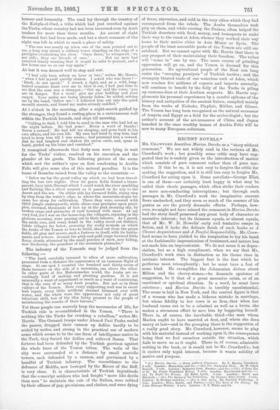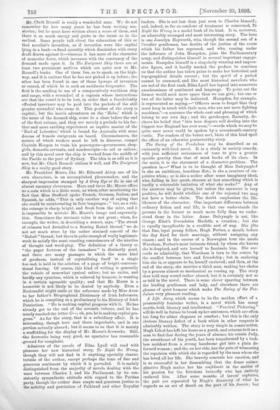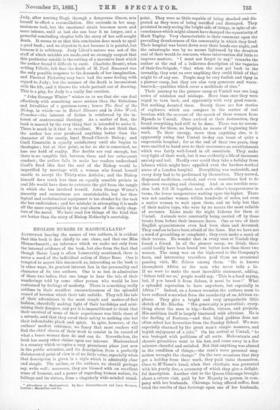RECENT NOVELS.* Mn. CRAWFORD describes Marion Darche as a "story
without comment." We are not widely read in the reviews of Mr. Crawford's work ; but possibly some critic may have sug- gested that he is unduly given to the introduction of matter which consists of pure comment rather than of pure nar- rative. If this be so, it is not easy to forgive the critic for making the suggestion, and it is eta' less easy to forgive Mr. Crawford for acting upon it, Some novelists—George Eliot, is one of them—are certainly least happy in what may be called their aerie passages, which often strike their readers as mere non-conducting interruptions; but through such passages in Mr. Crawford's work the imaginative current, flows unchecked, and they seem as much of the essence of his genius as are the purely dramatic effects. Perhaps, how- ever, we might not have missed the comment in Marion Darche had the story itself possessed any great body of character or narrative interest ; but its thinness equals, or almost equals, that of Mr. W. D. Howells' early and tentative essays in fiction, and it lacks the delicate finish of such books as A Chance Acquaintance and A Fearful Responsibility. Mr. Craw- ford seems to have yielded to the temptation to try his hand at the fashionable impressionism of treatment, and nature has not made him an impressionist. We do not mean it as depre- ciation, but as a high compliment, when we say that Mr.. Crawford's work rises in distinction as his theme rises in intrinsic interest. The biggest feat is the feat which he performs most triumphantly ; but he must have a feat of some kind. He exemplifies the Johnsonian dictum about Milton and the cherry-stones,—he demands opulence of suggestion, be it that of a great narrative crisis, or of an emotional or spiritual situation. In a, word, he must have substance ; and Marion Danko is terribly unsubstantial. The scene is laid in New York, and the central figure is that of a woman who has made a hideous mistake in marriage, but whose fidelity to her vows is so firm, that when her husband turns out to be a criminal as well as a brute, she makes a strenuous effort to save him by beggaring herself There is, of course, the inevitable third—the man whom Marion ought to have married at first, and whom she does. marry at last—and in the grouping there is the suggestion of a really good story. Mr. Crawford, however, seems to play with his material instead of working upon it, the consequence• being that we feel ourselves outside the situation, which fails to move us as it ought. There is, of course, admirable writing in the book, or it would not be Mr. Crawford's; but, it excites only tepid interest, because it wants solidity of motive and purpose.
* (1.) Marian Darche a Story without Comment. By F. Marion Crawford. 2 vole. London Macmillan and Co.—(2.) The Emigrant Ship. By W. Clark Russell. 3 vole. London : Sampson Low, Marston, and 00.—(3.) A Gray Ego or So. By Frank Frankfort Moore. 8 vols. Loudon : Hutchinson and Co.-
(4.) To Right the Wrong. By Edna Lynn , . 3 vols. London : et and Blaelcett.-0.) The Swing of the Pendulum.. By Frances Mary Feud. 2 vols. London : R. Bentley and Son.— (8.1 A Ltto Awry. By Percival Pickering. 3 vols. London : Bliss, Sands, and Foster.—(7.) Tho Soul of the Bishop. By John Strange Winter. 2 vols. London : F. V. White and Co.
Mr. Clark Russell is really a wonderful man. We do not remember for how many years he has been writing sea- stories; but he must have written about a score of them, and there is as much energy and gusto in the latest as in the earliest. Some people talk about the exhaustion of this or• that novelist's invention, as if invention were like capital lying in a bank—a fixed quantity which diminishes with every draft drawn against it—whereas it has more of the character of muscular force, which increases with the constancy of the demand made upon it. In The Emigrant Ship there are at least two prominent motives which are quite new to Mr. Russell's books. One of them lies, so to speak, on the high- way, and it is curious that he has not picked it up before; the other has been found in one of those byways of invention or record, of which he is such an assiduous frequenter. The first is the sending to sea of a comparatively worthless ship .and cargo, with a scoundrel of a captain whose instructions Ware that the vessel is to be lost, in order that a fraudulently effected insurance may be paid into the pockets of the still greater scoundrel who owns it. This portion of the story is capital ; but the hero's adventures on the Hebe,' which is the name of the doomed ship, come to a close before the end of the first volume, and they are merely a prelude to his fur- ther and more exciting experiences as captive master of the ' Earl of Leicester,' which is bound for Australia with some dozens of female emigrants on board. Circumstances, the nature of which readers must be left to discover, compel Captain Morgan to train his passengers—governesses, shop- girls, domestic servants, and nondescripts—to act as sailors ; and by this novel crew the ship is worked from the middle of the Pacific to the port of Sydney. The idea is as odd as it is new, but Mr•. Clark Russell utilises it well, and The Emigrant , Ship is a really good story.
Mr. Frankfort Moore, like Mr. Edmund Airey, one of his own characters, is an accomplished phrasemaker, and the sharpest impression stamped by A Gray Eye or So is one of almost uncanny cleverness. Here and there Mr. Moore offers us a coin which is a little worn, as when, after mentioning the fact that Miss Stafford spoke French, German, Italian, and Spanish, he adds, " This is only another way of saying that she could be uninteresting in four languages ; " but, as a rule, the coinage is sharp, bright, and fresh from the mint, and it is impossible to mistake Mr. Moore's image and superscrip- tion. Sometimes the intrinsic value is not great ; when, for example, the writer, in describing a sunset, says, " The streak of crimson had dwindled to a flaming Rehab thread," we do not set much store by the rather strained conceit of the "Rahab " thread; but there is quite enough of really legitimate work to satisfy the most exacting connoisseurs of the niceties of thought and word-play. The definition of a theory as "the paper fortress of the immature" is distinctly good, and there are many passages in which the same kind of goodness, instead of crystallising itself in a single bon mot, is held in the solution of a page of bright conversa- tional fencing. Of course, this kind of writing is generally the vehicle of somewhat cynical satire ; but no satire, and hardly any cynicism, which is relieved by humour, is wanting in a certain agreeable quality ; and that Mr. Moore is a humorist is not likely to be denied by anybody. Even a Nationalist might smile at the reference made by Miss Avon to her father's Biographical Dictionary of Irish Informers, which he is compiling as a preliminary to his History of Irish Patriotism. " He is making capital progress with it. He has already got to the end of the seventh volume, and he has nearly reached the letter C—; oh, yes, he is making capital pro- gress." As for the story, that is a subsidiary affair. It is interesting, though here and there improbable, and in one „portion actually absurd ; but it seems to us that it is mainly a scaffolding for the display of Mr. Moore's fireworks. Still, the fireworks being very good, no spectator has reasonable .,,ground for complaint.
Admirers of the novels of Edna Lyall will read with -pleasure her new historical story, To Right the Wrong. though they will not find in it anything specially oharac- teristio of the author, except perhaps the tone of fine and generous sentiment by whioh it is pervaded. It is mainly distinguished from the majority of novels dealing with the wars between Charles I. and his Parliament, by its con- sistently sympathetic attitude with regard to the Puritan party, though the author does ample and generous justice to the nobility and patriotism of Falkland and other Royalist leaders. She is not less than just even to Charles himself ; and, indeed, so far as candour of treatment is concerned, To Right the Wrong is a model book of its kind. It is, moreover, an admirably arranged and most interesting story. The hero is one Joscelyn. Hayworth, who, though the second son of a Cavalier gentleman, has doubts of the justice of the cause which his father has espoused, and who, coming under the influence of John Hampden, joins the Parliamentary army, and distinguishes himself in several important engage- ments. Hampden himself is a singularly winning and impres- sive figure, and it hardly needed the preface to convince us that the author has taken pains to make her historical and topographical details correct ; but the spirit of a period cannot be crammed, and like most historical novelists who are not of the first rank, Edna Lyall has lapsed into numerous anachronisms of sentiment and language. To point out the former would need more space than we can give ; but one or two of the latter may be indicated. Hampden, for example, is represented as saying,—" Officers seem to forget that they must keep in touch with their men, who are not mere fighting machines,"—a sentence the whole cast and phrasing of which belong to our own day ; and the gatekeeper, Barnaby, de- clares his belief that " this here dispute will devilup into the biggest war England has ever seen,"—words which we may be quite sure never could be spoken by a seventeenth-century rustic. For readers of the better sort, blots of this kind spoil the effect of an otherwise praiseworthy story.
The Swing of the Pendulum may be described as an eminently well-bred novel. It is a study in society comedy, with just sufficient seriousness of tone to give a greater specific gravity than that of most books of its class. In the main, it is the statement of a character•-problem. The question is,—" What is to be thought of Miss Dalrymple? Is she an ambitious, heartless flirt ; is she a creature of im- pulsive whim ; or is she a seeker after some imaginary ideal, who, failing in her quest, chooses at last something which is hardly a colourable imitation of what she seeks P" Any of the answers may be given, but unless the answerer is very positive, he will doubt whether one of the rejected two may not have a better claim. The doubt emphasises the life- likeness of the character. One important difference between ordinary fiction and real life, is that one understands the persons in the former so much more fully than we under- stand those in the latter. Anne Dalrymple is not, like George Eliot's Gwendolen Harleth, a creation ; but she is equally inexplicable in a credible sort of way. She jilts that fine, loyal young fellow, Hugh Forbes, a month before the day fixed for their marriage, without assigning any reason ; and in the course of a Norwegian tour she meets Wareham, For•bes's most intimate friend, by whom she knows she is despised, and sets herself to fascinate him. She suc- ceeds so admirably, that Wareham is torn to the centre by the conflict between love and friendship ; but in enslaving him she is, or appears to be, herself enslaved; and then, at the end of the story, she marries a third man, making her choice by a process almost as mechanical as tossing up. The story thus told may sound rather absurd, but it is certainly not so as told in the novel. There is some clever sparring between the leading gentleman and lady, and elsewhere there are gleams of quiet humour which make The Swing of the Pen- dulum very pleasant reading.
A Life Awry, which seems to be the maiden effort of a presumably feminine writer, is a novel which has many merits, both literary and intellectual. "Percival Pickering" will do well in future to break up her sentences, which are often too long for either elegance or comfort ; but this is the only obvious literary defect of a book which in other respects is admirably written. The story is very simple in construction. Hugh Lilcot has left his home as a youth, and returns to it as a man to find that during the years of absence his cousin Judy, the sweetheart of his youth, has been transformed by a luck- less accident from a strong handsome girl into a plain de- formed woman ; and she, on her side, has the pain of witnessing the repulsion with which she is regarded by the man whom she has loved all her life. She bravely conceals her emotion, and is so successful in her dissembling that the dense unima- ginative Hugh makes her his confidante in the matter of his passion for the frivolous butterfly who has entirely enslaved him. After some months of lovers' raptures, the pair are separated by Hugh's discovery of what he regards as an act of deceit on the part of his fiancee; but Judy, after nursing Hugh through a dangerous illness, sets herself to effect a reconciliation. She succeeds in her mag- nanimous task, but the emotional strain becomes more and more intense, until at last she can bear it no longer, and a powerful concluding chapter tells the story of her self-sought death. It seems to us that this conclusion does much to spoil a good book ; and we object to it, not because it is painful, but because it is arbitrary. Judy Lileot's nature was not of the stuff of which suicides are made, and we strongly suspect that this particular suicide is the cutting of a narrative knot which the author found it difficult to untie. Charlotte Brontii, when writing Villette, felt that the death of M. Paul Emanuel was the only possible response to the demands of her imagination, and Percival Pickering may have had the same feeling with regard to Judy ; but the manner of the death is inconsistent with the life, and it throws the whole portrait out of drawing. This is a pity, for Judy is a really fine creation.
"John Strange Winter" wishes us to see that she can deal effectively with something more serious than the flirtations and frivolities of a garrison-town ; hence The Soul of the Bishop, in which—as in Robert Elsntere and in John Ward, Preacher—the interest of fiction is reinforced by the in- terest of controversial theology. As a matter of fact, the book is marred by the very thing that is intended to make it. There is much in it that is excellent. We do not think that the author has ever produced anything better than the character of the manly, loyal Broad-Church Bishop ; and Cecil Constable is equally satisfactory until she begins to theologise ; but at that point, so far as she is concerned, we lose our hold of reality. Her doubts are real enough, but there is no tangible link between them and her subsequent conduct ; the author fails to make her readers understand Cecil's fixed idea that the soul of the Bishop would be imperilled by marriage with a woman who found herself unable to accept the Thirty-nine Articles ; and the Bishop himself does much less than an equally sensible prelate in real life would have done to extricate the girl from the tangle in which she has involved herself, John Strange Winter's sincerity and earnestness are unmistakable, but her theo- logical and ecclesiastical equipment is too slender for the task she has undertaken ; and her mistake in attempting it is made all the more regrettable by the real charm of the early chap- ters of the novel, We have read few things of the kind that are better than the story of Bishop Netherby's courtship.








































 Previous page
Previous page